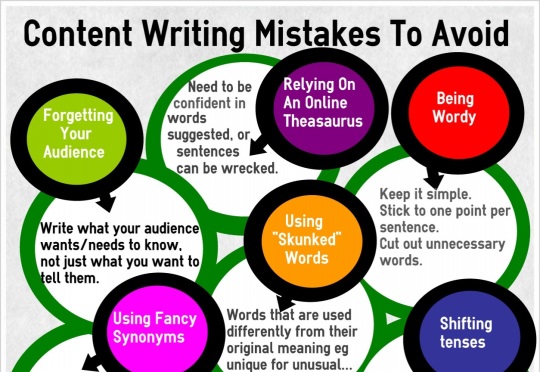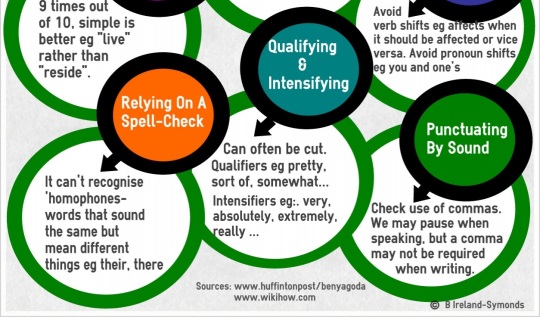Content Writing Mistakes To Avoid
Published on December 28, 2013
Published on Wealthy Affiliate — a platform for building real online businesses with modern training and AI.
It's not difficult to make mistakes when writing content for your website. Most of us make errors at one time or another, whether they be typos, language/grammar or punctuation errors. I know I do, even though I try hard to eliminate the most common ones.
There are a lot of resources here at WA that can help you to improve your writing. If you haven't checked out Jackie's recent training on common punctuation, grammar and spelling clangers - do so. She has also created a great sequel: common punctuation, grammar and spelling clangers: the sequel.
I've been looking at some other mistakes that we all want to try and avoid in our writing and pulled this infographic together from my research.
Let me expand on two of the points.
1) Relying on an online thesaurus. Not for a moment am I suggesting you shouldn't use one. If you find yourself using the same word several times within a couple of paragraphs, it's tempting to go to the thesaurus and choose a different word. Just be careful: Ben Yagoda (Writer and Language Expert) gives the example of the using word "tool" and wanting an alternative.
"The online thesaurus is a great tool."
If you put tool into an online thesaurus, it will throw up the options:
“instrument,” “apparatus,” “implement,” “device,” “means,” “utensil,” “contrivance,” and “gizmo.”
Ready to put this into action?
Start your free journey today — no credit card required.
Clearly not all these would be an appropriate substitute. - so only use the ones you are certain about.
2) Using " skunked" words. No it's not my expression, but I rather like it. it comes from Bryan Garner to describe words that 'still have an odor about them, so it's best to keep your distance'.
Yagoda argues that some words may have changed meaning over time but that doesn't mean we should be using them. He offers these examples to illustrate the point, with the suggested replacement words in brackets at the end of each sentence.
“Literally.” “I literally turned the house upside down looking for my car keys.” (Just leave it out)
“Impact” as a verb. “Google’s terrible annual report is really going to impact the stock market tomorrow.” (“Drive the stock market down.”)
“Unique” to mean “unusual.” “That’s one of the most unique outfits I’ve ever seen.” (“Unusual.”)
“Going forward.” “Going forward, we’re going to emphasize cost-cutting.” (“In the future,” “from now on.”)
“Reach out to.” “Let’s reach out to our customers and try to get them to increase their orders.” (“contact”!)
You may not agree with all Yagoda's examples but it's certainly something to think about.
Hopefully the other points are clear.
But don't let this or any other resource you see put you off writing content for your website. Most writers would say that their writing skills are a work in progress.


Share this insight
This conversation is happening inside the community.
Join free to continue it.The Internet Changed. Now It Is Time to Build Differently.
If this article resonated, the next step is learning how to apply it. Inside Wealthy Affiliate, we break this down into practical steps you can use to build a real online business.
No credit card. Instant access.